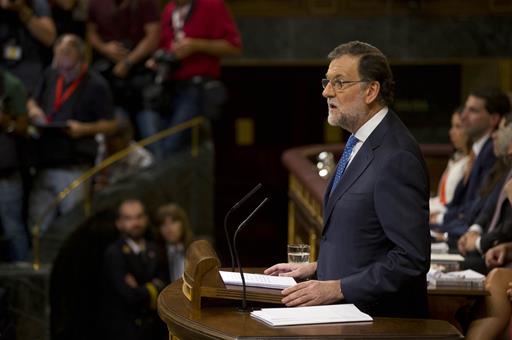Investiture session
Mariano Rajoy advocates stable and lasting government and offers various State pacts to Parliamentary groups
President's News - 2016.8.30
Lower House of Parliament, Madrid
The acting President of the Government requested the confidence of the Lower House because "Spain urgently needs a government" to effectively respond to the economic, labour and social challenges and to guarantee the security and unity of the Spanish people.
Mariano Rajoy highlighted that "the Spanish people have done an extraordinary job over recent years to overcome extreme economic difficulties and have played out a success story that is acknowledged and admired beyond our borders", and hence "it would not be fair to cloud the horizon of prosperity or hinder the recovery under way due to political paralysis". He also recalled that the measures committed to in order to reduce the public deficit to below 3% of GDP cannot be extended and it is necessary to submit the Draft General State Budget for 2017 to Parliament.
In his opinion, June's election results "are unequivocal" and never before, except in the case of an absolute majority, has there been such a distance between the first two parties in the number of votes. "I am here because that is what the Spanish people want and because the alternative I propose, as well as being the most respectful to the will of the Spanish people, is the most convincing and reasonable alternative", he stated.
Mariano Rajoy added that his proposal is "the only real possibility for Spain to enjoy a moderate government, and to avoid an adventure into radicalism, inefficiency and uncertainty", and considers that no "alternative exists that is in a position to assume immediate control".
Government of consensus with broad Parliamentary base
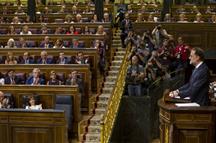 Pool Moncloa/Diego CrespoThe President of the Government stressed that Spain needs a "government that is stable, lasting, sound and reassuring", and which is not subject to constant fluctuations. "It is no use Spain having a government for one year, or even for two. Its problems call for a government for a longer period".
Pool Moncloa/Diego CrespoThe President of the Government stressed that Spain needs a "government that is stable, lasting, sound and reassuring", and which is not subject to constant fluctuations. "It is no use Spain having a government for one year, or even for two. Its problems call for a government for a longer period".
He also advocated a "government with a broad Parliamentary base that is capable of undertaking the major reforms that Spain needs by consensus and with the intention of ensuring that they are here to stay". To this end, Mariano Rajoy proposed a government with pacts, such as those already reached with two Parliamentary groups, which share the responsibility for overseeing the future of all the people of Spain. "I particularly call on those groups that defend the values enshrined in our Constitution".
Employment, key goal for government project
In his speech, the acting President of the Government set out the main aspects of his project for the next term of office, with employment featuring heavily. In his opinion, if the current rate of job creation is maintained, whereby half a million jobs are being created each year, Spain can aspire to having 20 million people in work by 2020.
Mariano Rajoy added that the fundamental challenge for the coming years is not only to undertake a good employment policy but also to maintain economic growth and bed down the recovery. "We have gone from stagnated economic activity to implementing a new model of development that is sounder and more sustainable. For the first time ever, we have come out of a crisis without devaluing our currency. And for the first time, Spain is growing and creating jobs without having to resort to external borrowing", he highlighted.
New reforms and State pacts
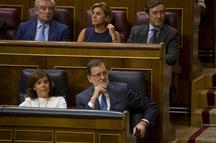 Pool Moncloa/Diego CrespoMariano Rajoy announced that in order to harness all of our potential as a nation and bed us down as a leading economic power, it is necessary to continue reforming those aspects on which the competitiveness of the global economy is based.
Pool Moncloa/Diego CrespoMariano Rajoy announced that in order to harness all of our potential as a nation and bed us down as a leading economic power, it is necessary to continue reforming those aspects on which the competitiveness of the global economy is based.
He also advocated the need for energy policy to contribute to competitiveness and to the fight against climate change. He considers that this goal must be enshrined in an Energy Pact that is open to all the political forces in the Lower House, and which considers the special needs of the Canary Islands as an outermost region.
The candidate for re-election also proposed new measures to support the self-employed that include a reform of the contribution system to "make it more flexible and suitable to the needs of each activity". He also proposed that the self-employed should be able to compute their pension under the best conditions and fully combine employment and pension entitlement, as well as extend the 50-euro flat-rate from the present six months to one year.
"It is necessary to propose new measures that contribute to business development, remove regulatory obstacles and avoid regulatory burdens that remove incentives to the growth of SMEs. We also seek to lower the fiscal burden on those that invest in development, and ensure their financing and liquidity with special control over late payments", announced the President of the Government.
Mariano Rajoy also urged the Parliamentary groups to take measures on the Digital Agenda, boost the presence of SMEs in electronic trade and consider the digital economy to be a sector in its own right.
On this point, he advocated "a National Pact on R&D+i to reach the goal of public investment of 2% of GDP in the activities of this sector as a whole by 2020".
Emergency plan to combat unemployment
The President of the Government proposed the need for an emergency plan to combat unemployment with the aim of making active employment policies more effective and stressed that a broad training programme for the unemployed will be developed that will use the modality of the training cheque, which allows each user to take the courses that best suit their needs. He also committed to boosting stable and quality jobs while adapting them to the new technological framework and the new labour realities.
"Without renouncing the reforms that have allowed us to change the trend in job creation", Mariano Rajoy proposes to reduce the number of employment contract modalities to only three, introduce mechanisms to reduce the dualism of the labour market and boost permanent employment (such as through extending the exemption from contributions for the first 500 euros of salary for a four-year period), and creating a capitalisation fund for workers through a similar scheme to that which prevails in such countries as Austria.
Lower taxes
Mariano Rajoy maintained his commitment to continue reducing the taxes on the Spanish people. "As soon as we reach our target to reduce the public deficit to below 3%, we will approve a two-point reduction in Personal Income Tax to stand at between 18% in its lowest bracket and 43.5% in its highest bracket".
He also announced that it is the government's intention to continue with the work of the Commission for the Reform of the Public Administration and to carry out "a comprehensive revision of spending to help identify potential duplications and thus reduce superfluous expenses".
Regional financing
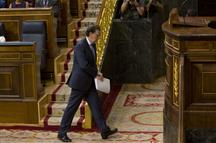 Pool Moncloa/Diego CrespoThe President of the Government maintained that "it is necessary to have a broad consensus" so that all our citizens can have access, under equal conditions, to the same level of quality of basic public services and "guarantee stable and sufficient financing of these services, helping protect them from such contingencies as electoral cycles, boom periods or economic recession".
Pool Moncloa/Diego CrespoThe President of the Government maintained that "it is necessary to have a broad consensus" so that all our citizens can have access, under equal conditions, to the same level of quality of basic public services and "guarantee stable and sufficient financing of these services, helping protect them from such contingencies as electoral cycles, boom periods or economic recession".
To that end, he offered the other parties, particularly the PSOE [Spanish Socialist Workers' Party], which governs in some of the autonomous regions, to open up "negotiations to jointly design a stable model that maintains the equality of all Spanish people in terms of receiving public services".
Pacts on pensions and education
In terms of pensions, Mariano Rajoy proposed initiating a period of dialogue to the Parliamentary groups, with a view to strengthening the public pension system in order to provide certain tranquillity to both present and future pensioners. "I can tell you here and now that, if I receive your vote of confidence, I will propose the immediate invocation of the Toledo Pact to undertake this task".
Along the same lines, he declared his intention, as President of the Government, "to begin talks with all the political forces to forge a National Education Pact", which must range from primary education to university studies.
"It is our duty, as the public authorities, to work for an education system based on liberty, equality and quality. This requires that we guarantee access to our education system by strengthening our policy on grants, ensuring attention is given to specific needs of pupils, combating the school drop-out rate and fostering co-existence in the classroom", argued the President of the Government.
In terms of education, Mariano Rajoy announced that the Statute on Teaching Staff will be approved to improve their access and professional development. Other goals are to create 100,000 places for Dual Vocational Training and to bolster university studies.
Gender-based violence
Another of the proposals made by the President of the Government is to reach a broad pact on violence against women that involves all parties, public authorities, affected bodies and the whole of society so that "together we can offer a way out and an opportunity to the victims". "Not one abuser has received a pardon from my government".
Other issues for agreement
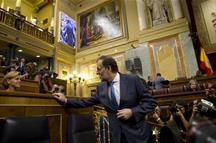 Pool Moncloa/Diego Crespo Mariano Rajoy set out other important issues that, in his opinion, should be subject to agreement, such as regeneration, foreign and defence policy, and the fight against terrorism.
Pool Moncloa/Diego Crespo Mariano Rajoy set out other important issues that, in his opinion, should be subject to agreement, such as regeneration, foreign and defence policy, and the fight against terrorism.
As regards political regeneration, Mariano Rajoy defended the controls established and mechanisms implemented to date in order to "recover every last cent of what is stolen by the corrupt". However, he acknowledged that this task "is never over" and that it will only be truly effective if it contains specific commitments agreed on by all the political forces.
These commitments include a refusal to offer a pardon to those sentenced for corruption, the regulation of lobbies to safeguard the defence of the public interest, the prevention of corruption in public procurement and in the granting of subsidies and greater transparency in the operations of political parties.
As regards Europe, the acting President of the Government and candidate for the Presidency of the Government, highlighted that full integration in Europe has been "an undisputed factor of wealth and prosperity" for our country. In turn, Spain has also been an "active, diligent partner that has always been willing to offer solutions to improve the European project", he stressed.
In this regard, Mariano Rajoy undertook to make the necessary reforms to maintain and strengthen the consensus that "has always presided over European policy regardless of the political hue of the different governments". In his opinion, foreign policy also "requires a State vision and a broad consensus to be developed", as is the case for the defence policy.
As regards the fight against terrorism, Mariano Rajoy proposed to continue backing a "comprehensive, global strategy" that involves all parties, such as that contained in the Pact against Jihadi Terrorism currently in force.
On this point, he committed to this pact being a channel for communication and for information in this area between the government and the other political forces as a whole, as well as a forum for reflection on future measures that should be adopted.
Unity of Spain
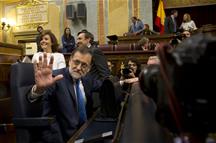 Pool Moncloa / Diego CrespoBefore concluding his speech, the acting President of the Government and candidate to the Presidency of the Government underlined that "the most serious challenge" facing Spain at this time is the "explicit threat to its territorial unity, to the equality of all Spaniards and to their co-existence".
Pool Moncloa / Diego CrespoBefore concluding his speech, the acting President of the Government and candidate to the Presidency of the Government underlined that "the most serious challenge" facing Spain at this time is the "explicit threat to its territorial unity, to the equality of all Spaniards and to their co-existence".
Mariano Rajoy stated that Catalonia is a "highly heterogeneous and plural" region, and hence the pro-independence politicians cannot push through their goals without causing a tremendous rupture in Catalan society.
These politicians are not proposing a mere debate on the State model, or on regional design, to which regard channels and possible scenarios exist, rather what they are proposing is "the liquidation of national sovereignty and respect for the law", claimed Mariano Rajoy. Unity, he continued, is "our best historical heritage", and also guarantees "equality and solidarity among the Spanish people".
Mariano Rajoy defended that he and his government were well disposed towards dialogue and cooperation with the Regional Government of Catalonia during the last term of office and to looking for formulas that better accommodate necessary inter-regional solidarity. He declared that a "fairer and more balanced union is undoubtedly a sounder and more lasting union". But he insisted that the first requirement for any fair solution is "respect for the law and for the rights of all Spanish people".





